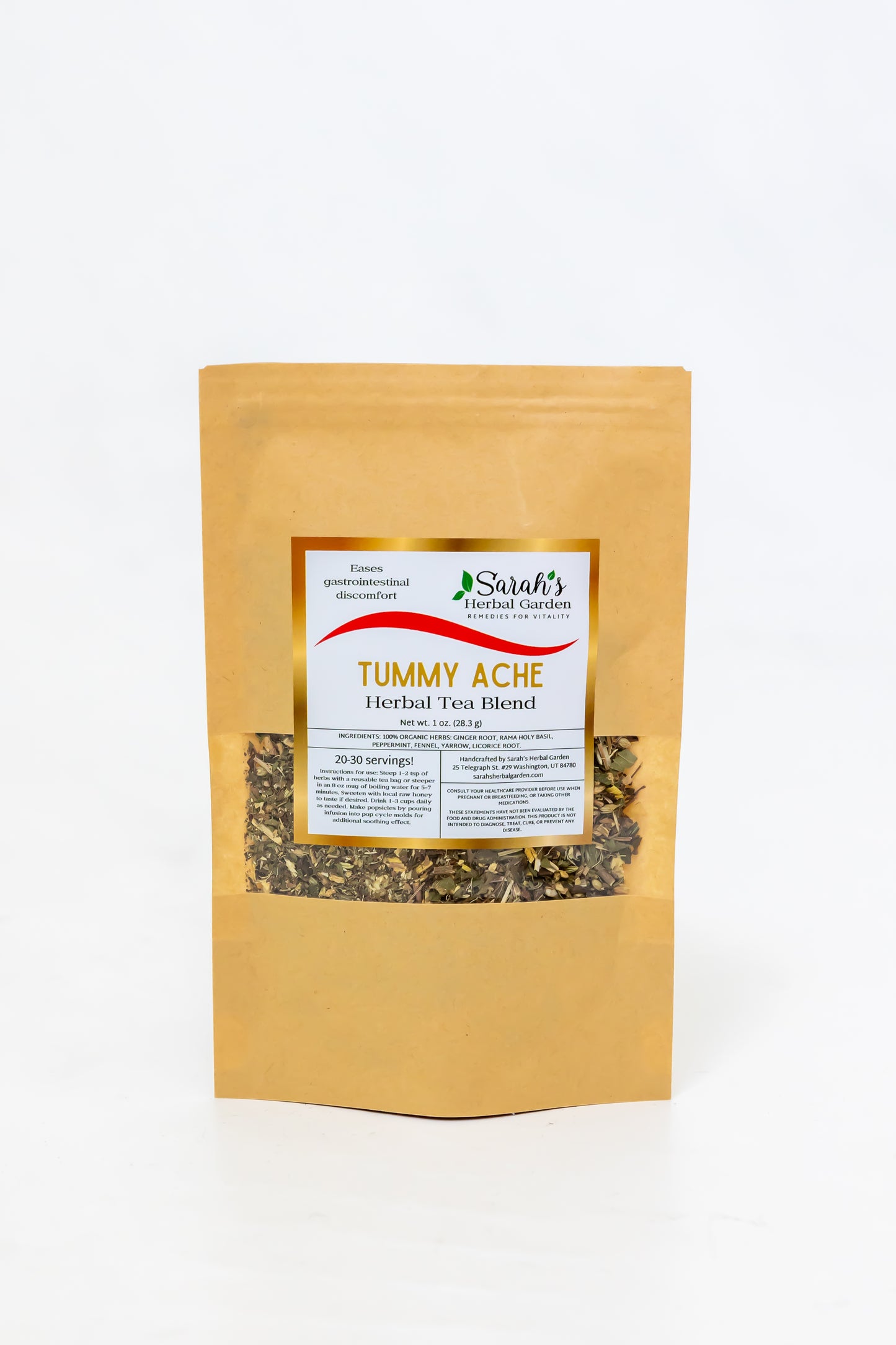Sarah's Herbal Garden
Tummy Ache {Herbal Tea Blend for Stomach Upset}
Tummy Ache {Herbal Tea Blend for Stomach Upset}
Couldn't load pickup availability
Net weight: 1 oz (28.3g)
Gastrointestinal discomfort can manifest in a variety of ways:
- Bloating
- Stomach pain
- Constipation or diarrhea
- Bacterial, yeast, or viral infection
- Nausea and vomiting
- Cramping
- Loss of appetite
- Acid reflux (heartburn)
- Food sensitivities
The herbs for this blend were selected to support optimal gastrointestinal function, from calming inflammation to restoring acid balance and smooth muscle movement in the GI tract.
These statements have not been evaluated by the Food and Drug Administration. This product is not intended to diagnose, treat, cure, or prevent any disease. Consult with healthcare provider if pregnant or breastfeeding, have an underlying health conditions, beginning an herbal supplement for the first time, or are taking other medications.
Share

Herbs used in this blend

Ginger Root
Ginger is known for its nausea-reducing properties. Ginger can help stimulate digestion and relieve bloating and gas by increasing the rate at which the stomach empties. It may reduce symptoms of stomach discomfort, such as cramping and pain, by acting as an anti-inflammatory and relaxing the intestinal tract. Some studies suggest that ginger may help alleviate symptoms of IBS, including pain and discomfort. Ginger's anti-inflammatory effects can help reduce inflammation in the digestive tract, potentially alleviating symptoms of conditions like gastritis.
Rama Holy Basil
Holy basil {Tulsi} may help reduce excessive stomach acid, which can alleviate symptoms of acid reflux and heartburn. Its anti-inflammatory effects can help soothe the digestive tract, potentially reducing symptoms of conditions like gastritis and inflammatory bowel disease (IBD). It can support overall digestive health by promoting better digestion and reducing symptoms of indigestion and bloating. It has antimicrobial properties that may help combat harmful bacteria in the gut, promoting a healthier balance of gut flora. Holy basil is an adaptogen, meaning it helps the body cope with stress. Since stress can negatively impact digestive health, reducing stress may indirectly benefit gastrointestinal issues.
Peppermint
Peppermint oil is known to be effective in alleviating symptoms of IBS, such as abdominal pain, bloating, and gas. It works by relaxing the smooth muscles of the gastrointestinal tract. Peppermint can help reduce symptoms of indigestion and bloating. It promotes the flow of bile, improving digestion and reducing feelings of fullness and discomfort. Peppermint can help alleviate nausea and is often used in the form of tea or essential oil inhalation for this purpose. Peppermint may help speed up gastric emptying, which can alleviate symptoms of indigestion and discomfort after meals. Peppermint has antispasmodic effects that can help relieve stomach cramps and spasms.
Fennel
Fennel seeds are often used to relieve symptoms of indigestion and bloating. They help relax the muscles in the gastrointestinal tract, promoting the passage of gas and reducing bloating. Fennel can help reduce the formation of gas and aid in its expulsion, providing relief from flatulence. Fennel tea is sometimes used as a natural remedy to help soothe colic in infants, reducing their discomfort. Fennel may help alleviate symptoms of IBS, such as abdominal pain, bloating, and gas, due to its antispasmodic properties. Fennel seeds can help stimulate digestion and improve overall digestive health. They are often chewed after meals to aid digestion and freshen breath. Fennel has anti-inflammatory and antimicrobial properties that can help maintain a healthy balance of gut bacteria and reduce inflammation in the digestive tract.
Yarrow
Yarrow can help stimulate digestion by promoting the secretion of digestive enzymes and bile. This can improve overall digestion and reduce symptoms of indigestion. Yarrow has anti-inflammatory effects that can help soothe the digestive tract and reduce inflammation, which may be beneficial for conditions like gastritis and inflammatory bowel disease (IBD). Yarrow can help relieve spasms and cramping in the gastrointestinal tract, providing relief from conditions like irritable bowel syndrome (IBS) and general stomach cramps. Yarrow may help reduce gas and bloating by relaxing the smooth muscles of the intestines and aiding in the expulsion of gas. Yarrow can act as an appetite stimulant, which can be helpful for those experiencing a loss of appetite due to digestive issues. Yarrow has been traditionally used to aid in the healing of gastrointestinal ulcers due to its astringent and wound-healing properties.
Licorice Root
Licorice root has been traditionally used to treat gastric ulcers. It can help soothe and protect the stomach lining by increasing mucus production, which acts as a barrier against stomach acid. Licorice root may help reduce symptoms of indigestion and acid reflux by promoting mucus secretion and reducing inflammation in the gastrointestinal tract. Licorice root has strong anti-inflammatory effects that can help reduce inflammation in the digestive tract, potentially alleviating conditions like gastritis and inflammatory bowel disease (IBD). Licorice root can help relax the muscles of the gastrointestinal tract, providing relief from spasms and cramps associated with conditions like irritable bowel syndrome (IBS). It has a soothing effect on the digestive system, which can help alleviate symptoms of discomfort, bloating, and gas. Licorice root is considered an adaptogen, meaning it helps the body cope with stress. Since stress can negatively impact digestive health, reducing stress may indirectly benefit gastrointestinal issues.


